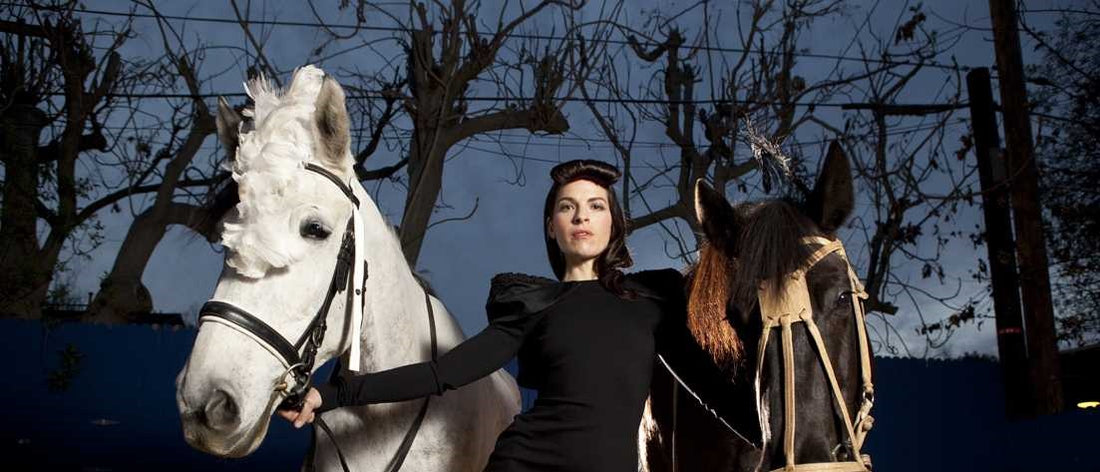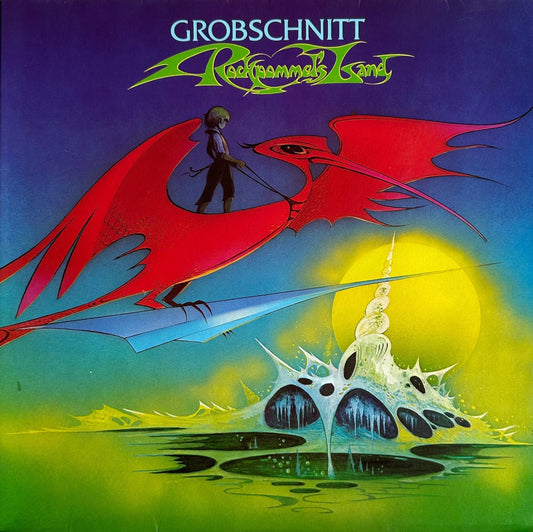I can’t imagine a more auspicious start to an indie songwriter’s career than the one Jesca Hoop had in the early 2000s. She was nanny to the children of Tom Waits. Understandably impressed by her idiosyncratic musical efforts (something he knows a thing or two about), Waits introduced her to industry folks who would appreciate her unconventional work.
Hoop’s voice is rich and her style odd. As a Californian who’s made England her home, she lets in the edges of British vowels and consonants, giving her a mystifying, Audrey Hepburn-like accent. But it never sounds affected, only like a true glimpse of what she hears in her own head. Actually, that’s not a bad way to describe her songs in general.
She started with a bang, releasing the album Kismet in 2007. In “Seed of Wonder” you can hear the articulate nature of her thoughts, both lyrical and musical. Just as characteristic is the way ideas cross over and bump into each other. The words come non-stop, phrases growing sideways from other phrases. And the harmony pops into new keys – and the melody into new registers — with no warning.
The rhythmic opening of “Intelligentactile 101” shows Hoop’s reggae influence, a flavor that brings a zing to her early songs. You can tell a lot about her musical personality by listening to that accompaniment, the way it hops around, sometimes obscuring the downbeat, introducing a distorted electronic ghost voice in a way that backup singers would normally be used. And through it all, acoustic folk instruments like mandolin keep the sound from going too pop. The high-pitched, breathy voice makes you expect a vacuous bubble-gum love song, but there’s an intense braininess behind the fluff. I don’t think Hoop would be offended by a comparison to the B-52’s.
Another early song that teaches the listener a lot about Hoop is “Silverscreen” (which she also rerecorded this as an acoustic track for the 2011 EP Snowglobe). The lyrics and their delivery drip with self-deprecating humor while this unapologetically modern woman imagines herself as a delicate, gossamer film star in Hollywood’s golden age. Maybe more to the point, Hoop seems to have the mind of a director, constantly juggling and planning a hundred things at once. Her songs sound like the inside of that kind of brain.
In 2009 Hoop released the album Hunting My Dress. For “Whispering Light,” she lets fellow singer/songwriter Willy Mason take the lead vocals while she backs him up. Oh, that dissonant melody! With lyrics that (as far as I can tell) paint life as analogous to a trek through the wilderness, what could be more appropriate than those surprising painful notes and weird rhythmic turns?
As an independent mind and a bit of an enigma, Hoop is inspired by other artists who rebel against society’s expectations. For her 2012 album, The House That Jack Built, she created an homage to one of the great iconoclasts of the early 21st century, the London graffiti artist and political activist known as Banksy.
“Ode to Banksy” begins “My pencil is dull, my pencil is dull, there’s not much lead left in my pencil.” That lyrical silliness turns to dark humor (a dig at Banksy’s overly distilled political imagery, maybe?) with lines like “Suicide bombers just need a hug.” The song has a bouncy American punk feel reminiscent of early Talking Heads.
Also from The House That Jack Built is “Peacemaker,” which continues that multi-layered, high-energy, electronic aesthetic. The medievalist poetic imagery is rich, even if its meaning is murky. It’s about men’s strengths versus women’s. It’s about the irony of going to war for the sake of peace. But primarily, it’s about sex, and the lurid refrain moans with primal lust, all the easier to hear through the bedroom wall because the instruments have gone quiet. (Explicit lyric warning.)
Gentle in its darkness, “Murder of Birds,” from the 2014 album Undress, displays both Hoop’s admirable acoustic guitar chops and the hauntingly wide range of her voice. She leaps and scoops, shaping each musical phrase like a sculptor’s curved tool plucking at wet clay. As ever, the rhythmic structure changes. The meter loosens from straight duple time to lilting 6/8 twice, signifying the change from painful reality to wishful thinking.
Hoop’s most recent album is Memories Are Now (2017). The music videos and promotion have been pumped up a notch, but Hoop is her old self: free from strict meter and traditional production concerns. She’s grown beyond the eye-twitching dissonances of her earlier work, but there’s still nothing conventional about her. The title song is a break-up declaration, as bursting with defiance and personal strength as you’d expect (no sitting and weeping in the corner for this woman), and no less powerful for being served on a platter of nothing but spare guitar patterns and tambourine.
The album’s final track is “The Coming.” It’s slow and aching and rewards patience. As with “Memories Are Now,” the accompaniment is barely there. This ballad succeeds in the impossible task of being both hopeless and hopeful at the same time: She’s taking on her doubts about religious faith; it seems these doubts have changed her way of thinking about everything. Pulling together the language to effectively express such difficult thought processes and internal conflicts is very rare. If you need proof that Jesca Hoop is an important spokesperson for the human condition, this is it.



